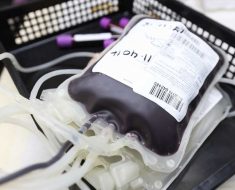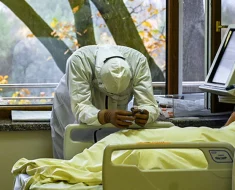Experts say while the new Charlize Theron movie accurately depicts the issues around postpartum mental health, it doesn’t fully explain diagnosis and treatment.

The movie “Tully” stars Charlize Theron as a stressed-out mother.
Credit: Getty Images
From the beginning, “Tully” makes no efforts to hide the realities of motherhood so few films and television shows present.
The movie’s main character, Marlo, played by Charlize Theron, is a maxed-out, stressed-out mother of two with a third baby on the way.
She and her husband, Drew, subsist on middle incomes and the challenges that brings in their New York suburban life.
Marlo’s brother, Craig, and his wife, Elyse, live a much more comfortable existence. Their children eat truffle mac and cheese while being cared for by a nanny who has a master’s degree in child development.
Elyse carries no evidence of stress, while worry is written all over Marlo’s face.
It’s evident early on in the film that balancing all the balls life has thrown at her is hard and getting harder for Marlo.
Eventually, a night nurse is brought in so Marlo can get a little help and hopefully some sleep.
The nurse, Tully, is a perky, quirky 20-something that’s full of life and vigor, a stark contrast to Marlo’s draining presence.
The longer Tully is around, the better Marlo becomes. She’s finding new vigor and energy. You can almost see the cloud of depression lift from her head.
Eventually, the movie’s plot twist kicks in. Marlo wakes up with Drew standing over her. Tully is nowhere to be seen.
A doctor from the hospital’s psychiatric ward walks in. Something is terribly wrong.
Postpartum mental health
Marlo’s diagnosis is never made clear. But her doctor mentions to Drew that she’s suffering from exhaustion and extreme sleep deprivation.
The words postpartum and depression are never uttered, just as “autism” is never used to describe the couple’s “quirky” son, Jonah, who’s inclined toward fits of rage, crying, and emotional extremes.
It’s not clear why writer Diablo Cody or director Jason Reitman don’t ascribe a diagnosis to Marlo’s condition, or even Jonah’s.
It’s this lack of clarity and the inattention to treatment that have some maternal health advocates upset with the film.
These healthcare providers theorize Marlo was experiencing postpartum psychosis, a rare condition that’s in fact a medical emergency, says Ann Smith, the president of Postpartum Support International.
Without the clarification, however, many people may believe the condition is related to the more familiar postpartum depression. They may even confuse the two as one in the same.
“Psychosis is a really serious thing. It is a medical emergency,” Smith told Healthline. “The thing that has upset people about ‘Tully’ is that there was no conversation about this or about treatment.”
Indeed, the final scenes of the movie end on a happy note, showing an improving Marlo at home with her children and husband.
Smith says she would’ve liked for the filmmakers to take the opportunity to talk about mental health treatment, which is highly effective for postpartum psychosis and other perinatal mood disorders.
“Is it their obligation to do it? No. Would it have been a nice idea to have the doctor say something? Yes,” Smith said. “Sometimes, when you go to the movies, after the last scene and before the credits, there’s sometimes a little information to finish the story. I think they could have said there is really good treatment for postpartum mental health issues at that point.”
Because the diagnosis isn’t clear, the movie leaves a lot of room for interpretation — and confusion.
“Postpartum psychosis is not severe postpartum depression,” said Dr. Diana Barnes, PsyD, LMFT, editor and contributing writer for “Women’s Reproductive Mental Health Across the Lifespan.” “It is a separate maternal mental health disorder. Although postpartum psychosis is rare, occurring in about 1 to 2 out of every thousand women who give birth, it is considered a life-threatening medical emergency, because the potential for serious repercussions like suicide and infanticide does exist.”
“Psychosis is the most severe and most rare perinatal mood disorder,” Smith added. “I want to make it very clear that it is not one of the other disorders getting worse and worse and worse and then finally morphing into psychosis. It is its own illness.”
The good news, Smith and Barnes say, is that postpartum psychosis or any perinatal mood disorders are treatable. It’s entirely realistic that Marlo would get better, but it takes work — and that’s something “Tully” leaves out.
“I have seen ‘Tully,’ and I do believe it presents a very accurate and at times gut-wrenching portrayal of the real experience of motherhood for many new mothers: the unbelievably painful exhaustion and, at times, frustration and despair,” Barnes told Healthline. “It is quite clear that she is suffering with depression during the third pregnancy and during the postpartum period. Whether we believe that she really did have postpartum psychosis or whether this was simply a fantasy playing out in her mind in her vehement struggle to find her lost self, this movie has sparked conversation, which I believe is most critical.”
Conversation, as it turns out, is a good thing when it comes to mental health issues, like postpartum depression, that so few are willing to talk about openly.
Help for mothers like Marlo
When her daughter was 12 days old, Myisha T. Hill was hospitalized for seven days for postpartum psychosis and suicidal ideation.
“The honest truth is that I hated the idea of yet again being a single mom, a societal statistic, feeling stuck on welfare with no way out,” Hill, a mental health activist, speaker, and author, said. “I couldn’t understand why I was alone and unable to hold a stable, healthy partnership.”
Hill told Healthline she felt like she was the problem, and that ending her own life would lead to a better life for her children.
“I thought death was a greater solution than living and thought that someone else would do a better job raising my children than I could,” she said. “I was burnt out and felt like I was living in an enclosed tunnel grasping for air with no way out.”
That vivid recollection will feel uncomfortably familiar if you’ve seen “Tully.”
Many of Hill’s words resemble Marlo’s actions and expressions, though the movie character never makes mention or efforts toward suicide.
Hill found help. She now shares her stories so that others like her will know they’re not alone and don’t have to suffer.
“The shame I associated with being weak is why I didn’t ask for help. I thought I was a supermom and that I could do it all alone,” she said. “In my head, I figured I had all the answers, had it all together, and God was all the help I needed. Now I know that silence is violence, and in the words of Audre Lorde, ‘My silence will not protect me.’ In fact, it almost killed me.”
Smith says perinatal mood disorders aren’t uncommon, and up to 1 in 7 women will experience postpartum depression.
Unfortunately, “The crime, the harm that is so upsetting, is that only 30 percent of people who should get treatment do,” Smith added.
When you look back at “Tully” after the plot twist is revealed, you may recognize warning signs of issues. You may also realize all the opportunities Marlo missed for help.
No one else in Marlo’s family sees or interacts with Tully. Drew doesn’t come downstairs at night, and he doesn’t wake when Tully brings the baby in the room.
Likewise, Marlo never meets with her doctor, or even the baby’s. This is one key time when doctors can screen their patients for potential issues.
“While OB-GYNs might detect postpartum depression in mothers, they don’t see their OB-GYNs until six weeks after the baby is born,” said Nyna Giles, author of “The Bridesmaid’s Daughter,” a book about her mother’s undiagnosed and untreated postpartum psychosis.
Postpartum psychosis typically happens in the first weeks immediately after delivery.
“Pediatricians see the mother earlier, and they should be screening the mothers as well as the newborn,” Giles told Healthline.
For Giles, her mother’s untreated mental illness led to a lifestyle of issues and struggles for her entire family.
“The collateral damage for our family was immense,” she said. “It shows what can happen without any intervention, medication, treatment, and family or spousal support.”
Giles, for example, never attended elementary school. Her mother had delusions that Giles was sick with a bad heart, internal bleeding, and rheumatic fever.
It’s been a lifelong journey for Giles to cope with the effects her mother’s mood disorders had on her own life.
“Women are the foundation of our families,” Barnes said. “When mothers are ill due to postpartum depression, it disrupts attachments and leaves infants at risk for developmental deficits as they grow. I’m hoping the emotional charge this movie has generated will open the door to even more conversation about mandatory screening during pregnancy, medical school curriculums that address reproductive mental health, and increasing awareness about the potential ravages of these illnesses when left untreated.”
“Our message is that you don’t need to suffer. You don’t need to have what happens to a lot of people happen to you,” Smith said. “Many women tell us they can’t look at pictures of their baby’s first year of life. They say they weren’t present and felt so miserable. You don’t have to have that happen to you. There is really good help.”
Source: Read Full Article





